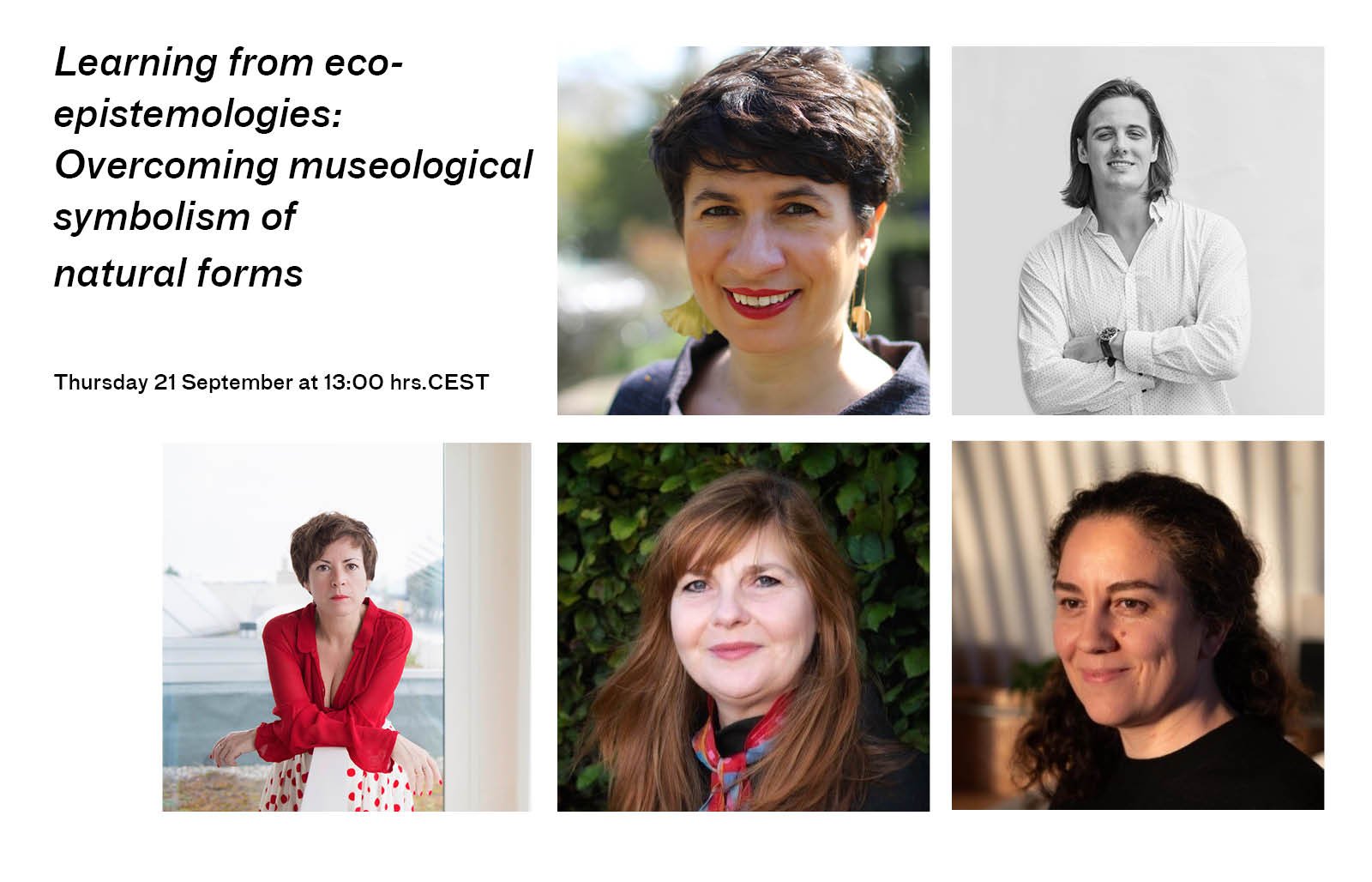Learning from eco-epistemologies: Overcoming museological symbolism of natural forms

Thursday 21 September 2023 at 13:00 hrs. CEST.
Lenght of session: 1 hour and 30 minutes
As part of the turn towards a more ecologically connected art institution, one that can expand towards multispecies understanding, we would like to question how exposure to nature has influenced institutional behaviour. Rather than simply looking at how organisations are addressing their new relationship to nature, or how they are trying to respond to current ecological and climate crises, we would like to explore the natural cross-pollination within institutional modus operandi coming directly from the natural world. While also expanding our field of references towards other museological institutions such as botanical gardens and zoos are already trying to learn from nature to engage with the ongoing troubles. We would like to question, not so much how we observe nature via the recent museological development but, rather, how nature is transforming the museum by influencing and altering institutional dynamics. In what ways institutions such as museums are really learning from nature and moving beyond a simplistic or symbolic connection to a bucolic past or to a rural idyll? We are interested, then, in how museums might acquire an authentic, natural politics, beyond an instrumentalization of the natural world for their own human, institutional benefit. Focusing on four different themes: flora, fauna, forest, and sea space we will try to embrace different entry points to nature and different ways of learning from nature; we seek to collaborate on a new institutional critique based on environmental humanities, and patterns and insights from the natural world.
Speakers
- Emma Nicolson, Head of Arts, Royal Botanic Garden Edinburgh , Edinburgh, UK
- Karla Sanchez, Director of Blackbird Cultur-Lab, Wexford, Ireland
- Chus Martínez, CIMAM Board member, Director, Institute Art Gender Nature, Basel, Switzerland.
Moderated by Viviana Checchia, Director, Void Art Centre - Derry, Northern Ireland, and Krisztián Gábor Török, curator, research, and critic at MODEM Centre for Modern and Contemporary Art, Debrecen, Hungary

CIMAM 2023 Rapid Response Webinars are made possible with the support from the Getty Foundation through its Connecting Professionals/Sharing Expertise initiative.
Biographies
Emma Nicolson
Emma Nicolson is Head of Arts at the Royal Botanic Garden Edinburgh. Since joining RBGE in 2019 she has led on the development of a new arts strategy, the creation of innovative exhibitions and interpretative opportunities that engage with art, nature, science, and the environment in the unique context of RGBE. In 2020 she launched Climate House and formed a collaboration with the Serpentine Galleries through the formation of the General Ecology Network. Prior to this she was the founding director of the award-winning ATLAS Arts(2010-2018) based on the Isle of Skye. During her tenure with ATLAS she undertook a two year guest curator role with Taigh Chearsabhagh Museum and Arts Centre in North Usit (2014-16). She has delivered large-scale commissions, exhibitions and music and performance programmes. She has more than twenty years’ experience of working in the visual arts as a practitioner, educator, and curator. She has worked with leading cultural institutions in Scotland, England, Ireland, and Australia, including the National Galleries of Scotland and the Museum of Contemporary Art, Sydney.
At RBGE she has recently curated solo exhibitions of Keg de Souza (Australia/India), Cooking Sections (UK/Spain) Natalie Taylor (UK), Yan Wang Preston (UK/China), Lisa Roet (Australia), Christine Borland (UK) Zoe Walker & Neil Bromwich (UK). Recent group exhibitions have included Florilegium: A Gathering of Flowers (contemporary approaches to botanical art), Seeing the Invisible (AR collaboration), Rhododendrons: Riddle, Obsession, Threat, Connecting Histories, (representing Indian Botanical Illustrations) and the Silent Archive (reflecting on decolonizing botanical collections).
Alongside this Emma is a Trustee of Creative Carbon Scotland and Embrace.Space for Art, Creation and Regeneration
Karla Sanchez
Karla Sánchez is a curator, art historian, farmer and educator. A former Fulbright grantee, she interned and worked at various museums both in Mexico and in the USA before moving to Ireland in 2004. She has participated since in numerous educational, research and curatorial projects. She held the Chair of the Board of Wexford Arts Centre and was member of its Visual Arts Committee until 2017. She was on the board of other art organisations and was the founder of Zorrofest, a multi-disciplinary event highlighting the life of William Lamport. She has also taken part in innovative theatre of reciprocity projects which have taken her to Denmark and Italy. She was the editor of Curious Minds, a free digital resource for primary school teachers. Her research interests are art the environment, art education, the role of art in contemporary societies, interdisciplinary collaborative practices, and existentialism.
As a farmer, she has been searching for alternative sustainable ways to combine farm life and the arts. She is now a passionate student of nature through regenerative agriculture. She is founder and director of Blackbird Cultur-Lab.
Chus Martínez
Born in Spain, Chus Martínez has a background in philosophy and art history. She is currently the Head of the Institute of Art of the FHNW Academy of Arts and Design in Basel, Switzerland, and Artistic Director of Ocean Space, Venice, a space spearheaded by TBA21–Academy, as well as curator at large at The Vuslat Foundation in Istambul.
She sits on the advisory boards of numerous international art institutions, including Castello di Rivoli, Turin; De Appel, Amsterdam; Deutsches Historisches Museum, Berlin; and Museum der Moderne, Salzburg. She has been the Chief Curator at El Museo Del Barrio, New York and dOCUMENTA (13) Head of Department. Previously she was Chief Curator at MACBA, Barcelona, Director of the Frankfurter Kunstverein. Martínez has organized numerous exhibitions and publications with contemporary artists. She lectures and writes regularly including numerous catalogue texts and critical essays, and is a regular contributor to international journals.
Recent publications are Like This. Natural Intelligence As Seen by Art. Hatje Cantz Verlag (2022); The Wild Book of Inventions, Sternberg Press (2020), Corona Tales. Let Life Happen to You, Lenz, (2021).
Krisztián Gábor Török
Krisztián Gábor Török is Budapest and Debrecen based, Hungarian curator, research, and critic. He works as curator at MODEM Centre for Modern and Contemporary Art in Debrecen, Hungary since March 2022. Krisztián completed his degree in Art History at the University of Glasgow in 2020 his thesis looked at alternative arts education models in Romania from the 1970s onwards. Török's curatorial practice questions the hegemony of exhibition making using alternative formats to present artistic processes such as peer learning groups, discursive platforms, and workshops.
Between 2020 and 2022 Török collaborated with the Transylvania based artist duo Monotremu (Laura Borotea & Gabriel Boldis) on their educational project Minitremu. For them he curated two art camps and a dialogical project for the 2021 Art Encounters Biennale. The project included The book gathers artists such as Alexandra Pirici, Dan Prejovschi and Szabolcs Kisspál.
Török was the member of CuratorLab at Konstfack, a group of 12 curators who curated the MA Spring exhibition at Konstfack in 2022 May. He was part of Berlin Biennale 12 Curators Workshop curated by Kader Attia and organised by Reem Shadid that took place between May and July 2022.Török is a fellow of the TheMuseumLab programme in 2023, multi staged residency program to support exchange between African and European Museum workers.
Török is the Budapest correspondent for Artforum International.
Viviana Checchia
Viviana Checchia is a curator, programmer, and researcher active internationally. Viviana is Director of Void Art Centre in Derry, and Co-Director of ‘Vessel’, an international curatorial platform based in Puglia, South of Italy, for the support of social, cultural, and economic development through contemporary art.
Previous to these roles she was Residency Curator at Delfina Foundation, London, Senior Lecturer on the MFA at HDK-Valand, University of Gothenburg and Public Engagement Curator at the Centre for Contemporary Arts, Glasgow. Viviana has produced and contributed to a range of international projects, including the Young Artist of the Year Award, Ramallah and the 4th Athens Biennale.
Viviana has lectured on curatorial studies and contemporary art practice at amongst others: the Centre for Curatorial Studies, Bard College, New York, MA Social Practice and the Creative Environment, Limerick Institute of Technology; the International Academy of Art Palestine, Ramallah. With Anna Santomauro, she received the 2013 ICI/Dedalus Research Award for research into the legacy of socially-engaged art practice in the U.S., and in 2016 was awarded the Igor Zabel Award for Culture and Theory Laureate’s choice for her contributions to the comprehension of and international interest in Eastern European art. Viviana holds a PhD from Loughborough University that focused on alternative Mediterranean curatorial practices. She currently serves as a trustee of cultural organisation, Timespan, Helmsdale, Scotland.